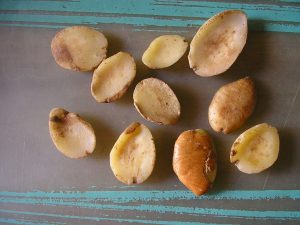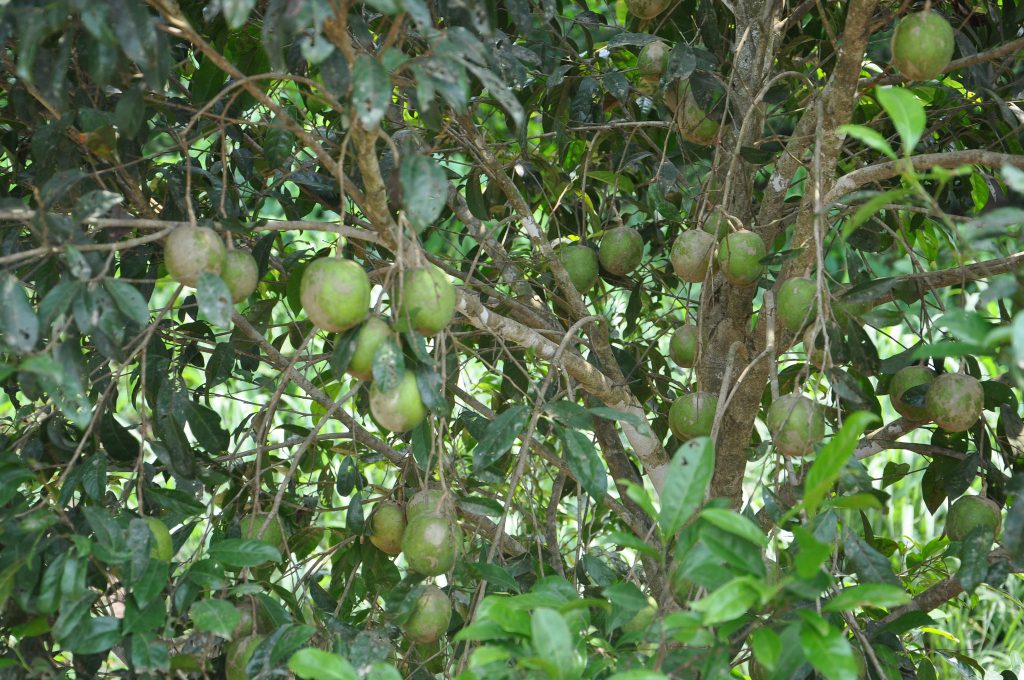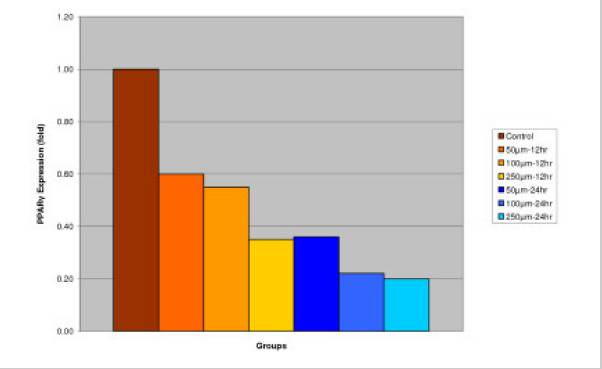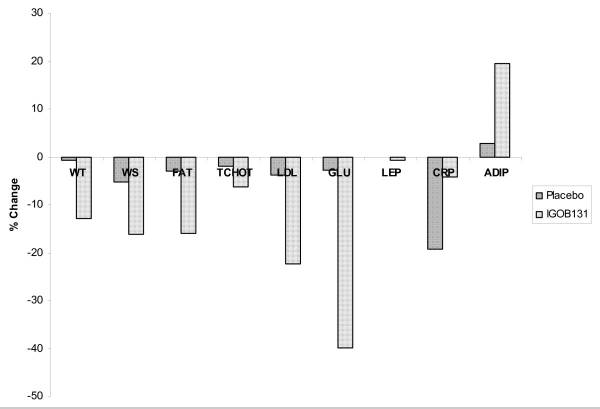
- Suppressing PPARγ. Blocking this receptor may enable African mango to minimize the formation of fat cells and the uptake of triglycerides.
Overview
Indigenous to the humid forests of several South and West African countries, including Angola, Congo, and Nigeria, African mango (Irvingia gabonensis) is a tall tree with tough bark that bears green mango-like fruits. The seeds of African mango, often referred to as dika nuts, are commonly extracted by hand and then eaten raw or roasted, pounded into butter, or pressed into oil.
Natural African mango supplements have recently grown in popularity due to findings citing their excellent nutrition and various potential health benefits, including:
- Pain reduction. The bark has been used in traditional African medicine for pain relief.1
- Reducing blood glucose levels.
- Promoting cardiovascular health.
Above all, African mango has been marketed for its potential contribution to fat burning and weight management. The principal bioactive ingredients responsible for said effects are flavonol, benzophenone, xanthone glycosides, and gallotanins.2 Rather than suppress appetite the way Garcinia cambogia seems to do, African mango is believed to work directly on the loss of fat cells.

How African Mango Might Help With Fat Loss
Suppressing PPAR
African mango seed extracts were found to inhibit adipogenesis on multiple fronts:3
- Down-regulating the expression of a transcription factor known as peroxisome proliferator-activated receptor gamma (PPARγ), which is widely accepted as a contributing factor of obesity.
- Reducing the expression of leptin, a hormone that helps regulate fat stores.
- Up-regulating the expression of the antihyperglycemic protein hormone adiponectin.
Though not directly burning fat, impeding adipogenesis may ultimately promote the loss of fat cells.

African Mango Benefits & Uses for Fat Loss
Early research concerning the role of African mango in fat loss has discovered that it may be able to reduce body weight, waist and belly size, and “bad” LDL cholesterol levels, as well as increase “good” HDL cholesterol levels. More than simply drop pounds or boost metabolism, these effects may help combat the development of such health complications as obesity and type 2 diabetes.4
Use of African mango for weight loss is surging in popularity not only because of its potential to burn fat, but also because it seems to be a safe diet alternative with few adverse side effects beyond flatulence.
Research
Animal Research
Animal research indicates that African mango may support fat loss by:
Human Research
Clinical studies have identified the potential capacity of African mango to facilitate weight management and fat content, although systematic reviews of these studies have pinpointed major flaws in methodology.8
In this randomized, double-blind, placebo-controlled investigation, 102 volunteers were given either a placebo or 150 mg of an African mango seed extract known as IGOB131 30 – 60 min before a healthy lunch and dinner for 10 weeks. IGOB131 was found to significantly improve measures of body weight, body fat, and waist circumference as well as cholesterol, glucose, adiponectin, and leptin levels compared to the placebo.
- The researchers concluded that “Irvingia gabonensis extract may prove to be a useful tool in dealing with the emerging global epidemics of obesity, hyperlipidemia, insulin resistance, and their co-morbid conditions.”9

In this randomized, double-blind, placebo-controlled trial, 40 obese adults on a regular diet took either a placebo or 3 servings of 1.05 g of African mango every day for 1 month. The results indicated that the African mango group lowered their body weight by 5.26 ± 2.37% compared to 1.32 ± 0.41% in the placebo group. African mango also acted as a significant suppressant of total cholesterol, LDL, and triglyceride levels, while increasing HDL levels compared to the placebo.
- The researchers concluded that “its [African mango] use should be further encouraged for the purposes of control of dietary lipids as well as for weight reduction.”10
Dosage for Fat Loss
- Successful clinical research studies have given from 300 mg – 3.15 g of African mango supplements per day.
- Typical supplement doses range from 300 – 1200 mg of African mango per day.
Available Forms
- African mango seed extract in the form of pills, capsules, tablets, powder, or drops
- Okolo CO, et al. Analgesic effect of Irvingia gabonensis stem bark extract. J Ethnopharmacol. 1995 Feb;45(2):125-9.
- Sun J, et al. UHPLC/HRMS Analysis of African Mango (Irvingia gabonensis) Seeds, Extract and Related Dietary Supplements. J Agric Food Chem. 2012 Sep 5;60(35):8703-9.
- Oben JE, et al. Inhibition of Irvingia gabonensis seed extract (OB131) on adipogenesis as mediated via down regulation of the PPARgamma and leptin genes and up-regulation of the adiponectin gene. Lipids Health Dis. 2008 Nov 13;7:44.
- Hasani-Ranjabar S. A systematic review of anti-obesity medicinal plants – an update. J Diabetes Metab Disord. 2013 Jun 19;12(1):28.
- Oben JE, et al. The use of a Cissus quadrangularis/Irvingia gabonensis combination in the management of weight loss: a double-blind placebo-controlled study. Lipids Health Dis. 2008 Mar 31;7:12.
- Nangue TJ, et al. Irvingia gabonensis fat: nutritional properties and effect of increasing amounts on the growth and lipid metabolism of young rats wistar sp. Lipids Health Dis. 2011; 10: 43.
- Abdulrahman F, et al. Effect of aqueous leaf extract of Irvingia gabonensis on gastrointestinal tract in rodents. Indian J Exp Biol. 2004 Aug;42(8):787-91.
- Onakpoya I, et al. The efficacy of Irvingia gabonensis supplementation in the management of overweight and obesity: a systematic review of randomized controlled trials. J Diet Suppl. 2013 Mar;10(1):29-38.
- Ngondi JL, et al. IGOB131, a novel seed extract of the West African plant Irvingia gabonensis, significantly reduces body weight and improves metabolic parameters in overweight humans in a randomized double-blind placebo controlled investigation. Lipids Health Dis. 2009 Mar 2;8:7.
- Ngondi JL, et al. The effect of Irvingia gabonensis seeds on body weight and blood lipids of obese subjects in Cameroon. Lipids Health Dis. 2005 May 25;4:12.
Article source: https://supplementsinreview.com/fat-loss/african-mango-fat-loss/








0 comments:
Post a Comment
I'd love to hear your comments, do share your thoughts with me...